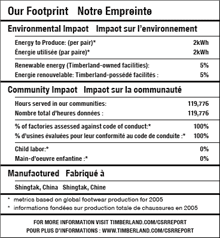|
Compassionate capitalism at Timberland
A new 'nutritional' label on shoe boxes makes a point -- but will it make the company money?
NEW YORK (FORTUNE) - The Timberland Co. is blazing new trails when it comes to corporate social responsibility. It is attaching a "nutritional label" to the boxes of its shoes and boots that reports on the company's social and environmental impact. And it is trying to raise awareness of the genocide in Darfur.
This is, presumably. good for the world. But is it good for business? Timberland (Research), a $1.5 billion a year New Hampshire-based maker of boots, apparel and accessories, has practiced its unique brand of compassionate capitalism for years. The company monitors its suppliers to try to make sure they treat their workers fairly. It builds its stores with green materials. Its packaging is eco-friendly. And its employees get 40 hours of paid time off every year to volunteer. Timberland's bottom line looks healthy, too: Sales have been growing by an average of about 10 percent a year and, in the last three years, the company's stock price has doubled, easily outperforming the S&P 500 Index. It's not clear whether Timberland's values are a driver of its financial success. But there's no doubt that Jeffrey Swartz, the firm's 45-year-old president and CEO, is pushing the envelope on social and environmental issues. "Make it better" -- the company's slogan -- means not only that it strives to make better products, but that it will help make the world better, Swartz told me. "We are about commerce and justice," he says. Last fall, for example, the company tackled the problem of genocide in Sudan in partnership with the actor Don Cheadle, who starred in the movie Hotel Rwanda and has become an anti-genocide activist. The company designed a limited-edition Timberland boot with the message "Not on My Watch," and it sells boot tags and T-shirts with a map of Africa and the words "Save Darfur" imprinted on the back. (Full disclosure: I wrote about Timberland in my book, "Faith and Fortune: How Compassionate Capitalism is Transforming American Business," and the company sent me sample gear, which I donated to charity.) The Darfur effort is a stretch, even for Timberland, Swartz concedes. "We don't have a single customer there. We don't have any suppliers there," he says. "Instead, we have brothers and sisters there." An Orthodox Jew, Swartz said he felt compelled to do whatever could be done about the genocide. "It would be insanity for me to assert that Timberland on its own, or even in coalition, could solve the problem in Darfur," he said. But he has gotten Darfur gear into the hands of celebrities Brad Pitt and Bruce Springsteen, which is good for the cause and for his brand. And profits from sales of T-shirts and boot tags go to AmeriCares, a nonprofit that provides humanitarian aid in the Sudan and elsewhere. Timberland's other new initiative -- what it calls a "nutritional label" for shoes and boots -- is even more far-reaching. The label, which looks like the government-mandated ingredients labels on food, provides information on where the shoes or boots were made, how much energy was consumed to produce them and how much renewable energy the company uses. The label also reports on the company's volunteer programs. Inside the box, the company calls upon its customers to take actions to help protect the environment or volunteer in their community. The labels are an intriguing idea, but they raise as many questions as they answer. There's no way to know, for example, what it means that a pair of shoes took 2kWh to produce. Is that a lot or a little? Does it include shipping? Nor can we measure Timberland against other firms when it tells us that it gets 5 percent of its energy from renewables. Joel Makower, founder of the Green Business Network and blogger on sustainability calls the label a "laudable first effort." But he says it does not go far enough. "As a 'nutritional' label, Timberland's leaves me..well, hungry for more," Makower writes in his blog at http://makower.typepad.com/. Of course, the first nutritional labels on food didn't mean much until they could be compared to others. One of Swartz's goals is to get other companies, including his competitors, to become more transparent about how and where their stuff is made. The bigger question is whether customers care about Timberland's values. Swartz admits he hasn't sold a lot of Darfur shirts. And only a handful of brands -- Ben & Jerry's, Tom's of Maine, Stonyfield Yogurt -- have turned their values into competitive advantages. But Timberland's employees care a lot about what the company stands for, and a big part of Swartz's job is engaging and motivating his people. I've talked to many of them, and they like being part of a company that stands for something.
Now a message about the company's values will be plastered on about 30 million shoeboxes a year. That may not help the bottom line, but it won't hurt, either. |
| ||||||||||||||||||||||||||||||||||||||||

